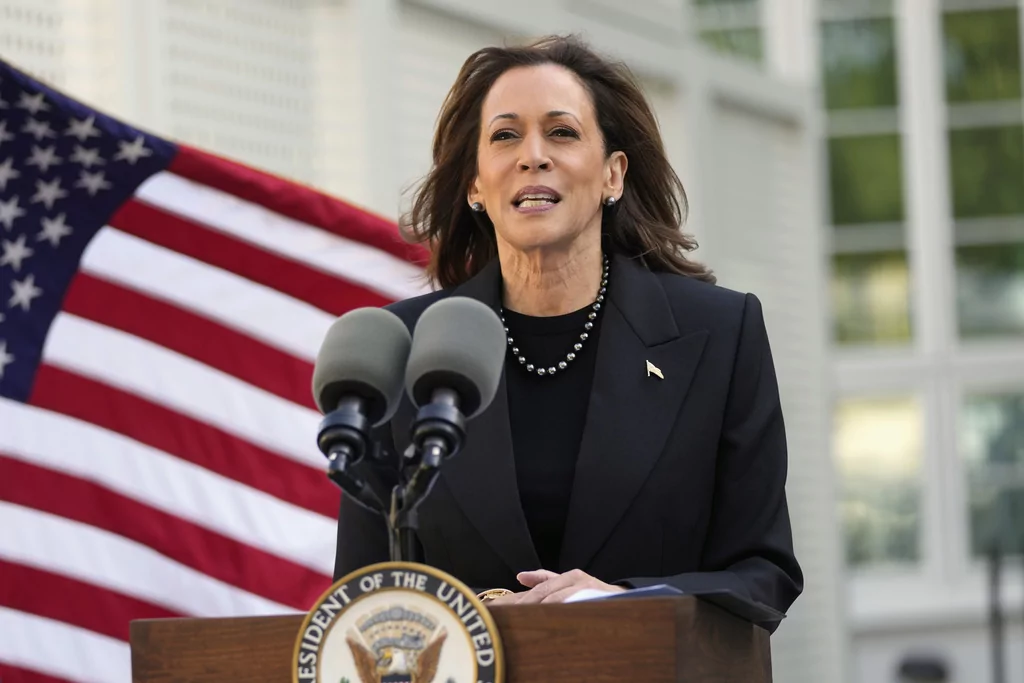
On Oct. 7, 2023, Hamas terrorists killed 1,200 Israelis in a terrorist attack, the likes of which the country had never seen. Since then, Israel has been determined to eradicate Hamas from Gaza, while fending back attacks from Iran and its proxies. The aftermath of the attack has strained relations between the United States and Israel, while the Democratic Party at home threatens to be torn apart by anti-Israeli activists, both within Congress and playing out on campuses across the country. This Washington Examiner series will take a closer look at all of these issues with far-reaching consequences. Click here to read part 1, part 2, and part 3.
Escalating clashes in the Middle East, the threat of an all-out regional war, and the failure to secure a ceasefire in Gaza have divided Democrats and provided new fuel for former President Donald Trump to go after Vice President Kamala Harris in the last month of an extremely close election race.
Harris has tried to balance crosscurrents in her party as the war overseas pushes its way into U.S. politics and threatens her chance to become president.
2024 ELECTIONS LIVE UPDATES: LATEST NEWS ON THE TRUMP-HARRIS PRESIDENTIAL RACE
Monday marked the one-year anniversary of the Oct. 7 attack when Hamas militants stormed Israel, killing 1,200 people and abducting 250 others. Israel’s response to the attack was swift and powerful. The ensuing war in Gaza has killed at least 41,900 Palestinians, wounded more than 97,300, and triggered a humanitarian crisis across the region, the Gaza Health Ministry said.
In the 12 months that have passed since the horrific attack, there has been profound loss for Israelis and Palestinians in what has become the deadliest war in a century between Jews and Arabs with no end in sight. Negotiations for a ceasefire have failed, and the war has expanded into a regional conflict that has led to Israel’s invasion of Lebanon and confrontations with Iran.

Back home, the daily chaos in the Middle East has injected fresh volatility in a political contest that has had its fair share of dramatic twists.
President Joe Biden’s support for Israel has infuriated Arab Americans and largely handcuffed Harris to his policies. It also upended what seemed like a sure bet with voters in swing states. Muslim Americans nationwide backed Biden by a huge margin in 2020. Many now feel like he has deserted them, and so they are deserting the Democratic Party.
The escalating conflict in the Middle East is also a factor for roughly 6 million Jewish Americans, many of whom are struggling with where their loyalties will lie in November.
Swing-state split
Battleground states where the two voting blocs could determine the outcome of the race include North Carolina, Michigan, Pennsylvania, and Georgia. Biden won Pennsylvania, Michigan, and Georgia four years ago, but the nearly 80,000 registered Muslim voters in Georgia exceeded the 11,700-vote margin of his victory.

A win in Michigan would be Harris’s clearest path to victory. The state is part of the blue wall that she needs to hold to block Trump from returning to the White House. But a win for Harris in Michigan is getting harder by the day as her campaign works against a time crunch to convince Muslim and Arab voters she is there for them.
During the presidential primary earlier this year, Abbas Alawieh helped organize a movement to encourage voters frustrated with the country’s involvement in Israel’s war in Gaza to vote “uncommitted.” More than 100,000 voters did just that in Michigan, one of seven key swing states with outsize importance in this election. Several thousands of other supporters have joined the cause in other states as well.
In any other election year, Alawieh’s group may have been overlooked by presidential candidates. But this year, in such a tight race, the Harris campaign has been scrambling to appeal to both Israelis and pro-Palestinian voters with mixed results.
Michigan Democrats weigh in
Arab Americans make up about 4% of the population in Michigan, the biggest share of any state in the country. Arab American leaders have harshly criticized the Biden administration’s response to the conflict and have tried to hold Harris’s feet to the fire as well. Their criticism has helped galvanize campaigns like Alawieh’s Uncommitted Movement and has put Harris in a delicate situation.
“What this administration has done is talk a lot about a ceasefire but failed to deliver one because they are failing to stop the weapons that [Israeli Prime Minister Benjamin] Netanyahu is using to prevent a ceasefire,” Alawieh said. “To employ this nonsensical strategy of deescalation through escalation, President Biden and his administration are misleading Democrats, are misleading the American people, when they talk about that as any kind of coherent strategy.”
Alawieh, who was the former chief of staff for Rep. Cori Bush (D-MO) and the former legislative director for Rep. Rashida Tlaib (D-MI), said his group has asked the Biden administration and Harris campaign for a sit-down, but they have said no.
“We have repeatedly asked that they meet with Americans who have family members who are experiencing the terror of American bombs right now,” Alawieh said. “Both Biden and Harris have repeatedly refused our request to meet with Palestinian American family members and Lebanese Americans who have family members on the receiving end of Netanyahu’s war crimes. There are tangible steps that Harris can take right now to build with this community that the Democratic Party has abandoned and betrayed. In order for us to reengage these voters, it requires looking them in the face as they send weapons to kill their family members. It’s a simple ask.”
“Vice President Harris, why won’t you sit down with Lebanese Americans, with Palestinian Americans who have family in Gaza? We have asked you repeatedly. Why are you saying no? I would recommend that as a first step to coming into this community and asking them for their vote,” he said.
Harris has been dogged by pro-Palestinian activists at campaign events too, and the vice president was interrupted by protesters at an August rally in Detroit.

On Friday, she briefly met with a group of Arab Americans in Flint, Michigan, trying to allay fears and distance herself from the Biden administration’s response to the war in Gaza. Alawieh’s group was not invited.
“The vice president heard directly their perspectives on the election and the conflicts in Gaza and Lebanon,” Harris’s campaign said in a statement, adding that she “expressed her concern over the scale of suffering” and discussed efforts to prevent a regional war.
Edward Gabriel, the president of the American Task Force on Lebanon, was at the meeting and said participants voiced their concerns over civilian casualties and displacement as well as the need for a ceasefire.
“This was a valuable two-sided exchange, and we made important progress in our relationship,” Gabriel said.
Also in attendance were representatives from Emgage, a Muslim American advocacy group that endorsed Harris, citing Trump’s “brand of authoritarianism” for “Muslim Americans, America, and the world.”
Despite its endorsement, the group said in bold letters on its website that its support of Harris did not mean it agreed with her on all the issues. Instead it was “an honest guidance to our voters regarding the difficult choice they confront at the ballot box,” they said.
Michigan also has a large Jewish community that has historically voted in line with the Democratic Party. Following Harris’s softened stance about Palestinians, they, too, have struggled to support the Democrats.
“Given how much Oct. 7 woke the Jewish community up to Jew hatred and rising antisemitism, it has very much hardened some people,” Rep. Haley Stevens (D-MI), who represents a large Jewish community in suburban Detroit, told the New York Times. “I do know some more independent-type voters, and I have heard from friends with young families, of friends of theirs who have traditionally voted Democrat, that they feel a little split.”
State Rep. Noah Arbit, a Democrat who represents the area of West Bloomfield Township, Michigan, was less optimistic.
“It’s ripped the 2020 Biden coalition asunder,” he said, adding that it was the reason “why this election is so close.”
Trump cast himself as Israel’s ‘protector’
Trump has capitalized on the discontent and has cast himself as Israel’s “protector.” During a speech at the Israeli-American Council summit in Washington, he reiterated his support for Israel and said the Jewish state would soon cease to exist if Harris was elected.
“It’s total annihilation — that’s what you’re talking about,” he said. “You have a big protector in me. You don’t have a protector on the other side.”
Trump also made headlines for criticizing Jewish Americans who don’t vote for him.

“If I don’t win this election, and the Jewish people would really have a lot to do with that if that happens, because at 40%, that means 60% of the people are voting for the enemy,” Trump said at an event with Miriam Adelson, a wealthy GOP donor and the widow of Sheldon Adelson. “With all I’ve done for Israel, I received only 24% of the Jewish vote.”
During a July interview with conservative radio host Sid Rosenberg, Trump’s tone was just as caustic when he called Jewish Democrats “fool[s].”
“Any Jewish person that voted for [Vice President Kamala Harris] or [President Joe Biden] … should have their head examined,” Trump said. “If you love Israel — or if you’re Jewish, because a lot of Jewish people do not like Israel … if you’re Jewish, if you vote for a Democrat, you’re a fool, an absolute fool.”
On Monday, during an Oct. 7 memorial event at his Trump National Doral Golf Club in Florida, the former president pledged to “remove the Jew haters” but was criticized for leaving the solemn occasion with a series of fist pumps to the disco anthem “YMCA” by The Village People.
The Trump campaign has also worked to widen its pitch to Arab Americans by dispatching his senior adviser and onetime lawyer Alina Habba to attract support in Michigan. Both of Habba’s parents are from Iraq.
Political casualties
The war in Gaza also played a part in ousting two Democrats who lost their primaries this year.
Reps. Jamaal Bowman (D-NY) and Bush were defeated in contests shaped by cash infusions from outside groups. Bowman and Bush are part of the “Squad,” an informal group of nine House Democrats known for being among the most progressive in Congress.
Bush was defeated by St. Louis County Prosecutor Wesley Bell, who was backed by pro-Israel groups. Bush’s long-standing criticism of Israel and advocacy for Palestinians helped fuel Bell’s campaign. Bush angered some Jewish leaders after the Oct. 7 attack for tweeting she couldn’t be “silent about Israel’s ethnic cleansing campaign.”
We can’t be silent about Israel’s ethnic cleansing campaign.
Babies, dead.
Pregnant women, dead.
Elderly, dead.
Generations of families, dead.Millions of people in Gaza with nowhere to go being slaughtered.
The U.S. must stop funding these atrocities against Palestinians. https://t.co/IlhoZvDD3P
— Congresswoman Cori Bush (@RepCori) October 30, 2023
Bowman was defeated by Westchester County Executive George Latimer, a centrist, in a race that drew $25 million in ad spending.
“The outcome in this race once again shows that the pro-Israel position is both good policy and good politics — for both parties,” Marshall Wittmann, a spokesman for the American Israel Public Affairs Committee, said.
Wittmann also called Bowman’s pro-Palestinian statements a “vituperative barrage of scurrilous attacks against the pro-Israel community.”
CLICK HERE TO READ MORE FROM THE WASHINGTON EXAMINER
Five of the nine “Squad” members faced primary challenges bolstered by their demands of an immediate ceasefire in Gaza.
Their pro-Palestinian support angered some of their fellow Democrats, Republicans, and pro-Israel groups who argued they weren’t supportive enough to the cause.





